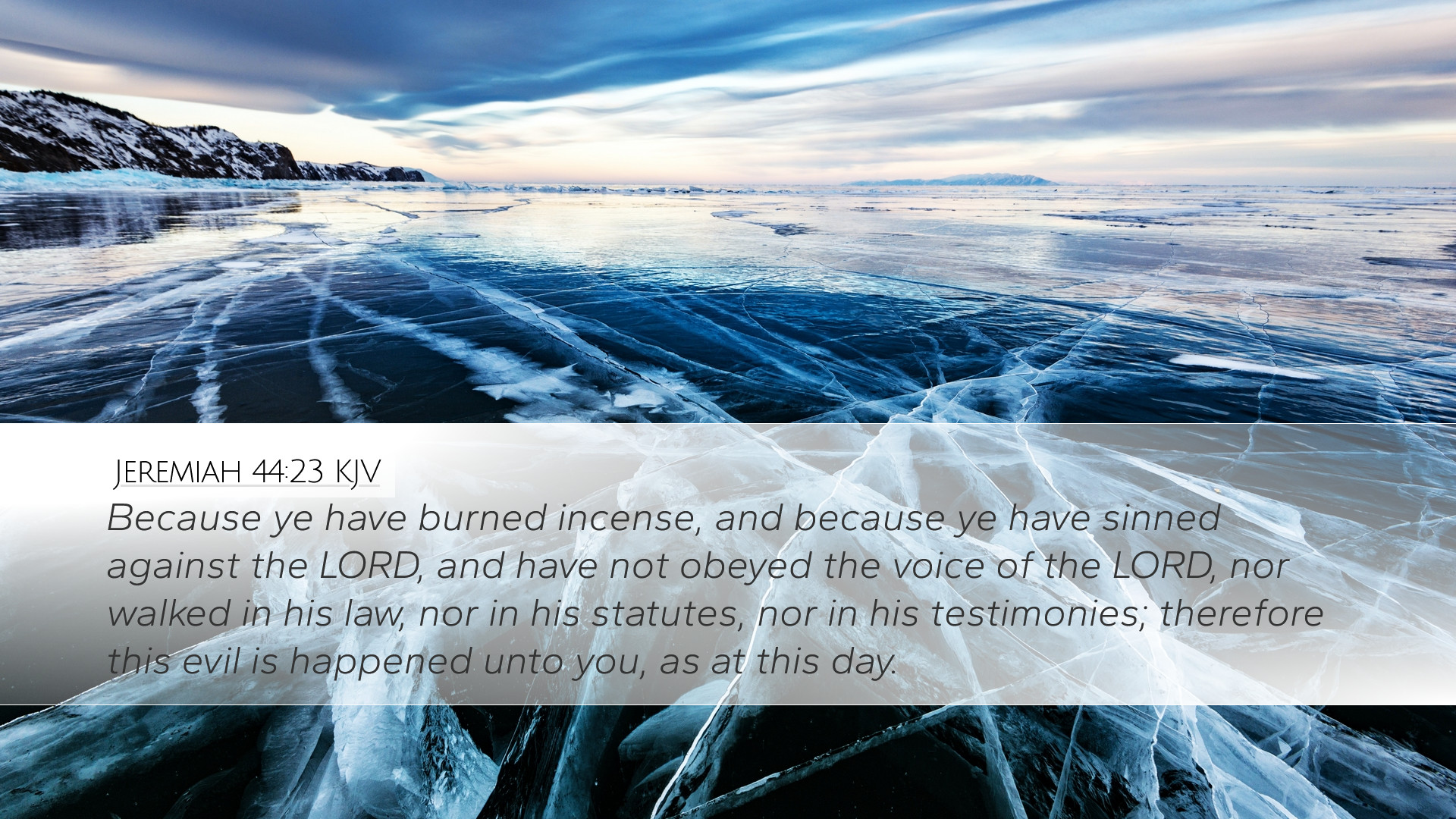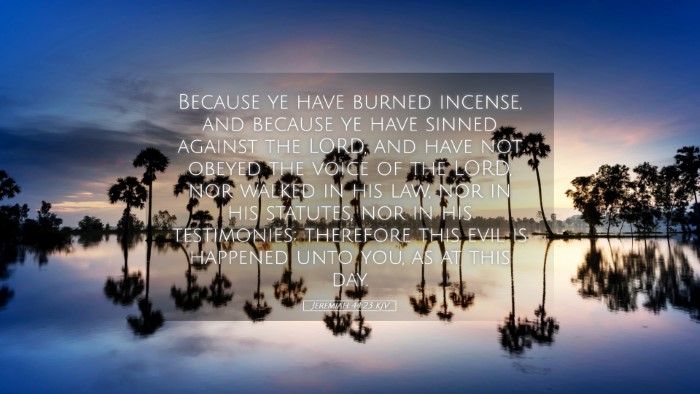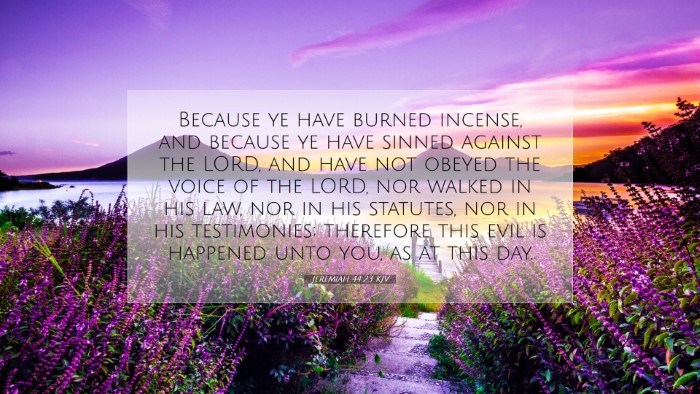Commentary on Jeremiah 44:23
Verse Context: Jeremiah 44:23 states, "Because ye have burned incense, and because ye have sinned against the LORD, and have not obeyed the voice of the LORD, nor walked in his law, nor in his statutes, nor in his testimonies; therefore this evil is happened unto you, as at this day." This verse serves as a pivotal declaration from the prophet Jeremiah, highlighting the consequences of disobedience to God.
Summary of the Commentary
This commentary synthesizes insights from esteemed public domain biblical scholars such as Matthew Henry, Albert Barnes, and Adam Clarke. It will explore the themes of idolatry, divine judgment, the nature of sin, and the firm call to repentance that radiates throughout Jeremiah's prophetic message.
1. The Nature of Sin and Disobedience
Matthew Henry emphasizes that the sins of the people described in this verse are multifaceted. They include a direct violation of God’s commandments and an active engagement in idolatrous practices, specifically the burning of incense to other deities. This act signifies not only unfaithfulness but a rejection of the covenant relationship that God established with Israel.
Continuing on this theme, Albert Barnes outlines that the refusal to obey the commandments of the Lord leads to inevitable consequences. He notes that the consequences mentioned can be viewed as both temporal and spiritual—immediate hardships and a long-standing separation from God’s favor. Barnes further underscores that God’s call to obedience is a reflection of His love and desire for His people to live in accordance with His will.
Adam Clarke adds to this discussion by explicating the nature of sin itself. He posits that sin is not merely an action but a state of being that ultimately reflects a heart turned away from God. Clarke points out that the people’s disobedience stemmed from a deep-rooted issue of faithlessness—a reliance on idols instead of the true Sovereign.
2. Divine Judgment and Consequences
Throughout the prophetic literature, there is a consistent theme of divine judgment. Henry observes that the ensuing evil mentioned in the verse is a direct outcome of the people’s rebellion. The phrase "this evil is happened unto you" serves as a reminder that God’s judgment is not arbitrary but a result of the people’s choices.
Barnes remarks that the harsh reality of judgment should lead to a sober reflection among the hearers of this message. When confronted with the consequences of their actions, the call to repentance becomes even more urgent. This is not merely a historical account but serves as a warning to future generations about the importance of fidelity to God.
Clarke reminds readers that God’s judgment is not solely punitive but also corrective. He explains that the purpose of divine consequences is to lead people back to repentance and to restore the broken relationship between God and His creation. Thus, while the "evil" is a result of their sin, it is also a catalyst for potential redemption.
3. The Call to Repentance
In conjunction with the theme of judgment, Henry notes that embedded in Jeremiah’s message is the call to repentance. The people are exhorted to turn from their sinful ways and return to God’s statutes. Henry emphasizes that true repentance involves not just an acknowledgment of sin but a heartfelt conversion—a turning away from idolatry back to the living God.
Barnes further elaborates that repentance is an integral part of salvation history. The prophet's message serves as both a warning and an invitation to return to God. The acknowledgment of sin must be followed by actionable repentance, which includes faith and obedience to God’s commands.
Clarke stresses that repentance must be sincere and rooted in love for God. He argues that true repentance is demonstrated through the fruits it produces—evidence of a transformed life that honors God’s commandments. This act of turning back requires humility and a willingness to submit to God’s will.
4. Implications for Today’s Believers
This commentary presents significant implications for contemporary readers. The themes drawn from Jeremiah 44:23 demonstrate that while the historical context may differ, the principles remain applicable for believers today. Just as the Israelites faced consequences for turning to idols, modern believers are called to examine their own lives for areas of spiritual disobedience.
- Self-Examination: Believers are encouraged to assess their own faithfulness to God. Are there modern "idols" that distract them from obedience?
- Understanding God’s Judgment: Recognizing that God desires relationship over ritual, readers are invited to see that consequences are part of God's discipline aimed at restoration.
- The Necessity of Repentance: Just as the Israelites were called to repent, today’s faithful are reminded that genuine response to God’s call includes acknowledging one’s sins and returning to Him with sincerity.
Conclusion
The powerful warning found in Jeremiah 44:23 serves as a timeless reminder of the consequences of disobedience and the grace that accompanies repentance. Through the insights provided by Matthew Henry, Albert Barnes, and Adam Clarke, readers gain a nuanced understanding of the text and its implications for both historical Israel and the church today. The call to commitment to God, free from the lure of idolatry, is as relevant now as it was then.


